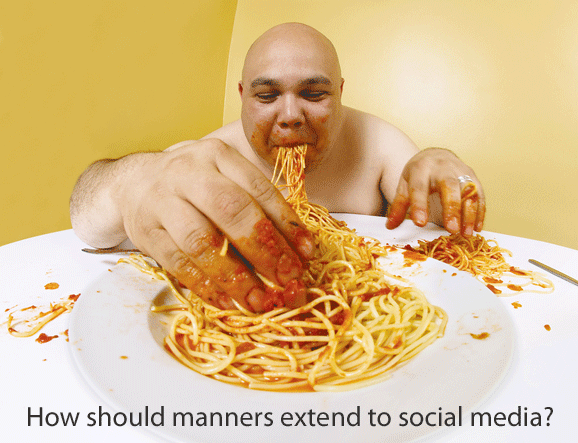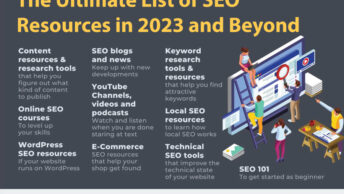
Whenever I hear the word “etiquette” visions of stuffy old charm schools play in my head. I don’t believe you have to (or even should) be nice to everyone all the time just because you want everyone to like you. It’s okay to dislike people, disagree with people, and share honest opinions as long as you can back them up. I’m also not a big believer in wearing a peachy little persona all the time just because other people tell you that you should.
I’m going to throw a buzzword at you, but one I think really matters — authenticity. I’d rather someone truly be themselves when I meet them in the social media space as opposed to watching them putting on a show.
That said, I’m a surprisingly big fan of general social media etiquette. I think it’s often less about manners and more about basic common sense. There are plenty of things that you wouldn’t want people doing to you while you’re on social networks, blogs, or using other social media tools. So don’t do those things to others.
If you want to avoid coming across as a complete jackass, getting yourself banned, or just being blacklisted by your network, here are 20 tips for social media etiquette you might want to keep in mind.
- DON’T spam. Ever — Self-explanatory, no?
- DON’T keep everything private. — Online privacy is important. It’s very important. But if you’re keeping every social interaction private, why are you even taking part in social media? Stick to emails and instant messengers and text messaging if that’s your goal, and stop making everyone else feel like your “club” is too exclusive.

DON’T “go after” competitors. — If your competitor does something stupid, comment on it to your heart’s content. But don’t take part in social media sabotage — trying to bury their posts or news stories, trying to get them banned from social media platforms, or pretending to be an unhappy customer for example.
- DON’T create multiple handles to “gang up.” — If other people aren’t supporting your viewpoint, that should tell you something. It’s never okay to comment using multiple fake identities to try to support your own point (making it look like several people are agreeing). Not only is that idiotic, but you will get caught and exposed.
- DON’T try to incite a mob mentality. — In addition to not setting up multiple identities of your own, also avoid trying to incite a social media mob. If you blatantly go around telling everyone to comment on something with the same opinion, you’re guilty of manipulating the conversation. Share a link? Yes. Tell people what to say or encourage them to gang up? I don’t think so.
- DO think before “speaking.” — Yes, social media involves the ability to publish your thoughts instantly. But just because something pops into your head, it doesn’t mean it should be shared with the world. Think first.
- DO personalize messages and introductions. — When you first connect with someone new and they don’t already know you, go ahead and say hello. Let them know how you came across them. It’s a little less creepy and you might just make a great impression.
- DO think (and network) outside your circle. — If your social networks only involve people who agree with you, you’re living in a box. It’s silly at best.
- DON’T post questionable photos of others without their permission. — Regardless of whether or not you legally need a model release to post a certain photo, don’t post anything questionable or compromising of someone else unless you check with them first. It’s just the right thing to do. And if you don’t, remember this — karma’s a bitch. You have no idea what they have on you.
- DON’T send automated messages to new followers. — When someone follows you on Twitter, don’t use automated tools to immediately bombard them with messages (no matter how sweet you think you’re being in your not-so-personal “hello”). Remember, it’s not just you annoying them — others are doing it too.
- DO use your real name whenever possible. — At a bare minimum, use a recognizable name (such as a common pen name everyone already knows for you). When you interact anonymously, very little holds you accountable for your actions and words.
- DON’T excessively link to your own site(s). — This is another common sense one. No one cares about your site enough to want to see a link to it in every message you send out there in social media land. You’ll eventually just be viewed as a link spammer.
- DO give back. — Social media is a two-way street. Give as much as you get. Better yet, give even more!

DON’T turn into a social media stalker. — Please don’t follow people around on the social Web like a lost puppy. It really is rather creepy. Unless you’re best buds, no one wants to see you not only on Facebook and Twitter but also on all of their niche social sites ranging from crocheting to auto body repair.
- DON’T invite everyone you know to every social media tool you decide to use. — If they’re already networking with you in two or three places, that’s enough. Really. Unless the new service is completely ground-breaking, don’t nag them with invites.
- DO try to make your tweets comprehensible. — I try to avoid txt spk. Not everyone is a teenager who grew up with it in their blood. Cut the rest of us some slack and try to use… oh, I don’t know… words? By all means, abbreviate when necessary. Just try to use shortcuts your audience will widely understand.
- DON’T swap your name for a string of keywords. — When you comment on someone’s blog or create a social media handle, stick to your name. Don’t use a string of keywords because you think it’s good for SEO. It’s usually not (most of those links are no-follow by default). And people want to feel like they’re talking to a person (or your company) — not “detox foot spa.” I literally just pulled that example from some of my own blog spam.
- DO listen to what others have to say. — Conversations are two-way streets. Enough said.
- DON’T unfollow people just because they don’t follow you back. — Seriously. How lame is that? If the person noticed you and thought you were worth following, they would have. Either tweet things that make you worthy of a follow, or knock off the follow spam crap just to try to build your own follower count artificially.
- DO submit other people’s material to news aggregators and social bookmarking sites. — When you only share your own material, you just look like an egotistical little snot. Oh…. That’s what you were going for? Then proceed.
I’m sure you brilliant folks can come up with more tips on social media etiquette, so share some of your favorites in the comments. They can be general tips on social media etiquette or tips specific to different tools and platforms.







Great post, really liked your thoughts, and you've reinforced a key I've been learning recently. Your final point actually, (20) submitting OTHERS material to social bookmarking sites. I know this is important, and I need to start doing it more. Thanks for the reminder. I may as well start now!
Nice image example you have shows for manners less comment posters. I am a blogger too who actually face these kind of comments and conversations on my posts.I respect your thoughts too.
This is really very helpful & informative about SMO
I think this is a really good list. This is probably the best list in theory, however reality is a little different. There is for example a Time constraint factor, and how would you overcome your competitors , if they are abusing the system, while you play it fair? Another issue is to do such well comments and socializing you can't outsource this to just anyone, and to whomever you outsource this kind of job it would be very very costly. It would be of course amazing, if all people read this, and think about it, unfortunately this whon't happen. “nice guy always loses”
You can add – when retweeting things then retweet the source rather than some lame SEO trying to get kudos…you know who you are @seosmarty! 🙂
Nice list, although that title is a bit convoluted 🙂
This is a great article, some good tips on social media here.
Good sound advice, hope everybody who reads takes note.
Great pointers, good tips
Anothe simple one. REPLY to people who take the time to communicate with you directly!
I have a note to add to your last point. When submitting other peoples work, articles, tweets, pictures etc, please reference them in your posts! It is only fair to give credit to your sources. Great post Jen, I sincerely enjoyed reading it. @AdsMitchell
Very interesting! People should definitely take note.
Nice tips…very much interesting…
Love it! Great list.
Agreed, within reason. But at the same time, it's not always realistic to reply to everyone — especially as you or your company gain popularity. Trying to do so is inefficient and unproductive and takes time away from producing the content people are following you for in the first place. It's a fine line sometimes, but one we all have to walk.
Honestly I need to do that more myself. When people make it easy, I tend to do it more but in my primary niche unfortunately not everyone works to make social bookmarking and sharing easy.
Anyone who's been in this game long enough knows that if their competitors are gaming the system, mimicking their behavior is not the right way to go. If all someone is after is short-term benefits, social media is not for them. Social media is a long-term effort; not a “campaign.” Screw up by gaming the system now (just b/c competitors do) can screw up your reputation long into the future.
The “nice guy” doesn't always lose when it comes to the white vs black hat approaches. In fact, it's those who create great content consistently without having to “game” people who tend to perform the best overall in the long run. As for it being costly to hire someone, well, if you can't do it yourself and you can't afford to hire someone capable of handling it, then you're simply not ready to be in that line of business yet — it's no different than any other area in business in that sense.
Thank you, thank you for taking the time to write such a comprehensive do and don't list!!! It drives me crazy sometimes, because many of these points are simply common sense.
This is a great set of rules to be guided by. I have to admit though, in my early days on twitter, I was guilty of breaking a few of these. I found over time that the best approach is to just talk to people and have conversations and share the information and websites that are interesting to you. By staying honest and real, I've discovered that more like-minded people are able to find and follow me. And of course 10 quality followers who you interact with a much better than 1000 you don't.
GREAT LIST!!! I do #20 a lot!! 🙂
Another one. Although Twitter is not a place to hold followers hostage, do think twice before unfollowing or blocking people who you have chatted with.
Think whether a Tweepler's conversation has benefitted you or not. Instead of thinking,”Who do hell she think she is?”, think if that person's tweet warrant a THANK YOU or I AM SORRY or I HAVE MISUNDERSTOOD YOU.
Basically, I NEED to unfollow some people who are not following me because only in this way, I can follow those who follow me. I am one of those who have almost no restrictions to who I follow, because anyone can be a life-saver. And unless a person has proven himself to be rude, I never block.
The thing I see most common on Twitter, is that people are quick to label and stereotype. Don't. do that! Label the action….not the person.
Well done! Basic stuff, common sense… but if common sense were so common, more people would have it, no? I'm RTing now. I hope a lot of people read it! Nice job, thanks! Brian
Very interesting! People should different,show different side
Have read several articles already about the Dos and Don'ts in social media but it is still a good idea to refresh our mind about what to do and what to avoid. I really like most the idea about sharing or bookmarking other people's work. Sometimes, when I noticed that some people bookmarked my site or posted comments to my blog, it is an instinct for me to return the kindness that they've done by either commenting on their blogs or visiting their sites.
Love it…almost everything are mentioned, can't think of any that should be added.
Thank you for sharing. I’d like to ask for your permission to use your tips on my blog.
Should you ask the lady of the house to bring or the man of the HOUSE?
And what about kids who should they ask the stepmom or the father of the house to ask for dinner?
I agree, the best thing is to always be you. Why pretend to be someone you’re not or why put on a false attitude, it will just stress you as well as people around you. Be true, be yourself, that’s the key.
[…] “Go After” Competitors (from Dr Journal): Talking bad about competitors makes you look petty, conniving and silly. It won’t do wonders […]
nice picture use i really like this !
These are great tips for everyone actively using social networks. We should always be responsible on what we post online. I hope it’s okey if I re-shared your helpful tips in my blog. Thank you!
We would be very happy if you share our tips via social media options. But please do not republish articles / tips from DirJournal.com without first obtaining permission from the site owner.
And you’re right. It’s very important to be responsible in social media sharing. Your behavior is immediately available to potentially thousands of individuals at any given time, and once you say it or do it, you can’t take it back.
[…] Directory Journal Search and Social Blog […]
Good article. I just signed on to Linked-in on Monday.
I uploaded info about me, and surfed around looking for profiles of folks I have known.
On Tuesday, I was embarrassed to see that these folks could see my footprints on their profiles…they knew I was checking them out. Wow. Powerful tool. Use appropriately.
So, by Thursday I am receiving a few requests to “link”. That is what it is all about, but what of the idiots I was glad to leave in my past? What do I do with their requests? Is is kosher to discriminately select those I like and omit those I did not? (ie, Frank was a great guy at AJAX, Inc. – great to hear from him…looks like he’s going places. Versus Jedd who was a jerk, who probably is a jerk whereever he is or will end up. All three of us worked side-by-side…Can I add Frank and reject Jedd?) Brave new world. Scary. Tailoring one’s on-line persona….an art form!
Stu – I don’t think there’s anything wrong with being a bit discriminating in who you network with via social media tools. In fact, I’d like to see people be more selective in who they add. One of my biggest pet peeves is the person who “follows” 10k people (when we all know you can’t truly follow that many people with interest) because it helps them grow their own follower counts. Use the tools to connect with people you want to connect with. There’s no reason to let those you want to avoid muck up your community. If you don’t want them there, there’s probably a good reason for that.
[…] – Social Media Etiquette: 20 Dos and Don’ts to Avoid Looking Like An Ass […]
I have a note to add to your last point. When submitting other peoples work, articles, tweets, pictures etc, please reference them in your posts! It is only fair to give credit to your sources. Great post Jen, I sincerely enjoyed reading it.
Excellent addition. 🙂 I know it’s sometimes tough to do this, especially in tweets where characters are very limited, but it’s the polite thing to do. I don’t think detailed attribution is always necessary if you simply link to someone, but if you’re using or submitting any of their material in a way that people might assume it’s yours, attribution is always a must.
Great post. I particualrly agree with the point about being yourself, and using real names. Another thing I always like about a twitter account is when it has a relevant picture, if it has no picture, for me it just looks wrong.
The real name issue has been on my mind a lot lately due to that policy on G+. In fact, that’s why I’ve stopped using the network.
Given that the audience here is of a business nature, I stand by using real names or recognizable pen names. But that ability to use recognizable pen names (or new ones to build recognition under that branding) is vital.
If this blog were addressing a more everyday userbase, I’d feel very differently. Privacy is paramount there, especially with certain groups (like abuse victims or those who have been stalked in the past — something I understand from personal experience). Under no circumstances would I say those individuals should feel like they have to use their real name — especially now when companies are making it tougher than ever to maintain the privacy of your social media accounts. But for business users, it’s not about being anonymous. That’s bad for business anyway. So we might as well use our real names or decide early on what we’d like to be known as. Random-sounding handles just don’t cut it.
For me it’s all about your audience and the quality of the blog. A blog like this deserves to have some decorum used, others blatent keyword spamming are a goer. Do we know if google takes a view on blog posts with keywords?
Using keywords is not a problem. It makes good sense. It’s keyword spamming / stuffing that is a problem (and which can hurt your rankings). You can see Google’s stance on it in their content guidelines — http://support.google.com/webmasters/bin/answer.py?hl=en&answer=66358.
[…] Social Media Etiquette: 20 Dos and Don’ts to Avoid Looking Like an […]
These tips should be common sense for everyone! But the obvious must be said, because people are kind of losing track of all of these in social media. I bet most of them wouldn’t say or do what they do in social media when it comes to real life!
Hi,
I really enjoyed your post. Good common sense outweighs crude comments and rudeness to the max. I’m not a prude, but, I don’t enjoy swearing and especially the F word. There really is no need to speak in that tone. It just makes me think that they are screaming for attention and not in a good way. Thanks for reminding everyone how to act when it comes to social media.
Geri Richmond
Nice image example you have shows for manners less comment posters. I am a blogger too who actually face these kind of comments and conversations on my posts.
it is really a good list of all the points, your tips are really helpful and will improve our working style on social networking website. It will help to improve our method and get more benefit. thank you so much for sharing such a great post.
Great Post and nice picture , I like it.
Loving this list of Twitter do’s and don’ts 🙂
I’ll add this to my weekly read up and will publish on Sunday.
– Stuart
Tip number 6 is so true. I have a friend who was set towards a great career and ruined it up by making questionable political comments on a hot topic causing most people to demand his head to be served on a plate.
One should always be careful regarding what they say when using social media, more so, when one uses social media to promote a business.
[…] can use Jennifer Mattern’s comprehensive list of Social Media Do’s and Don’ts to get started. Have questions? Ask us in the […]
Politics and religions should always be avoided on Social Media…definitely a DONT.